
Halo, kalau kamu merasa tulisan saya ngebantu kamu, kamu bisa ucapkan terima kasih lewat saweria .
If you feel this website help you, you can donate at saweria .
What I Used in This Tutorial
Docker v20.10.24 (include in Flatcar)
Traefik v2.10.5
It was easier to setup using docker and traefik.
And I found this github.com/jhuckaby/cronicle nginx issue , the owner docker-cronicle repo, soulteary said it was more easy to use traefik than nginx to serve cronicle.
Since I don’t want to waste time, I try my setup using traefik at first try, and it work without problem.
How To
- Create
docker-compose.yml
version: "3.8"
services:
traefik:
environment:
- TZ=Asia/Jakarta
image: traefik:v2.10.5
ports:
- target: 80
published: 80
mode: host
- target: 443
published: 443
mode: host
labels:
- traefik.enable=true
- traefik.docker.network=traefik-cron
#enable this to enable traefik dashboard
# - traefik.http.middlewares.https-redirect.redirectscheme.scheme=https
# - traefik.http.middlewares.https-redirect.redirectscheme.permanent=true
# - traefik.http.routers.traefik-cron-http.rule=Host(`traefik.yourdomain.com`)
# - traefik.http.routers.traefik-cron-http.entrypoints=http
# - traefik.http.routers.traefik-cron-http.middlewares=https-redirect
# - traefik.http.routers.traefik-cron-https.rule=Host(`traefik.yourdomain.com`)
# - traefik.http.routers.traefik-cron-https.entrypoints=https
# - traefik.http.routers.traefik-cron-https.tls=true
# - traefik.http.routers.traefik-cron-https.service=api@internal
# - traefik.http.routers.traefik-cron-https.tls.certresolver=le
- traefik.http.middlewares.security-headers.headers.hostsproxyheaders=X-Forwarded-Host
- traefik.http.middlewares.security-headers.headers.sslredirect=true
- traefik.http.middlewares.security-headers.headers.sslproxyheaders.X-Forwarded-Proto=https
- traefik.http.middlewares.security-headers.headers.stsseconds=63072000
- traefik.http.middlewares.security-headers.headers.stsincludesubdomains=true
- traefik.http.middlewares.security-headers.headers.stspreload=true
- traefik.http.middlewares.security-headers.headers.forcestsheader=true
- traefik.http.middlewares.security-headers.headers.framedeny=true
- traefik.http.middlewares.security-headers.headers.contenttypenosniff=true
- traefik.http.middlewares.security-headers.headers.browserxssfilter=true
- traefik.http.middlewares.security-headers.headers.referrerpolicy=same-origin
- traefik.http.middlewares.security-headers.headers.customresponseheaders.x-robots-tag=noindex, nofollow, nosnippet, noarchive, noimageindex, notranslate
#enable this to enable traefik dashboard
# - traefik.http.routers.traefik-cron-https.middlewares=security-headers
# - traefik.http.services.traefik-cron.loadbalancer.server.port=8080
volumes:
- /var/run/docker.sock:/var/run/docker.sock:ro
command:
- --providers.docker=true
- --providers.docker.exposedbydefault=true
- --providers.docker.swarmmode=false
- --entrypoints.http.address=:80
- --entrypoints.https.address=:443
- --certificatesresolvers.le.acme.email=you@yourdomain.com
- --certificatesresolvers.le.acme.tlschallenge=true
- --api=true
networks:
- traefik-cron
cronicle:
image: soulteary/cronicle:0.9.23
expose:
- 3012
labels:
- traefik.enable=true
- traefik.docker.network=traefik-cron
- traefik.http.routers.cronicle-http.rule=Host(`cronicle.yourdomain.com`)
- traefik.http.routers.cronicle-http.entrypoints=http
- traefik.http.routers.cronicle-http.middlewares=https-redirect
- traefik.http.routers.cronicle-https.rule=Host(`cronicle.yourdomain.com`)
- traefik.http.routers.cronicle-https.entrypoints=https
- traefik.http.routers.cronicle-https.tls=true
- traefik.http.routers.cronicle-https.tls.certresolver=le
- traefik.http.routers.cronicle-https.middlewares=security-headersk
- traefik.http.services.cronicle.loadbalancer.server.port=3012
volumes:
- /etc/localtime:/etc/localtime:ro
- /etc/timezone:/etc/timezone:ro
- ./data/data:/opt/cronicle/data
- ./data/logs:/opt/cronicle/logs
- ./data/plugins:/opt/cronicle/plugins
extra_hosts:
- "cronicle.yourdomain.com:0.0.0.0"
environment:
- TZ=Asia/Jakarta
# you can read all available config at
# https://github.com/jhuckaby/Cronicle/blob/master/docs/Configuration.md
- HOSTNAME=cronicle.yourdomain.com
- CRONICLE_foreground=1
- CRONICLE_echo=1
- CRONICLE_base_app_url=http://cronicle.yourdomain.com:3012
- CRONICLE_web_socket_use_hostnames=1
- CRONICLE_server_comm_use_hostnames=1
- CRONICLE_WebServer__http_port=3012
- CRONICLE_WebServer__http_bind_address=0.0.0.0
- CRONICLE_WebServer__https=0
- CRONICLE_web_direct_connect=0
- CRONICLE_smtp_hostname=mail.yourdomain.com
- CRONICLE_email_from=no-reply@yourdomain.com
- CRONICLE_smtp_port=587
- CRONICLE_mail_options__secure=false
- CRONICLE_mail_options__auth__user=no-reply@yourdomain.com
- CRONICLE_mail_options__auth__pass=passwordEmail
- CRONICLE_mail_options__connectionTimeout=10000
- CRONICLE_mail_options__greetingTimeout=10000
- CRONICLE_mail_options__socketTimeout=10000
healthcheck:
test: ["CMD-SHELL", "wget --no-verbose --tries=1 --spider localhost:3012/api/app/ping || exit 1"]
interval: 5s
timeout: 1s
retries: 3
networks:
- traefik-cron
networks:
traefik-cron:
Run with
docker-compose up -dYou should change the default password immediately after installation
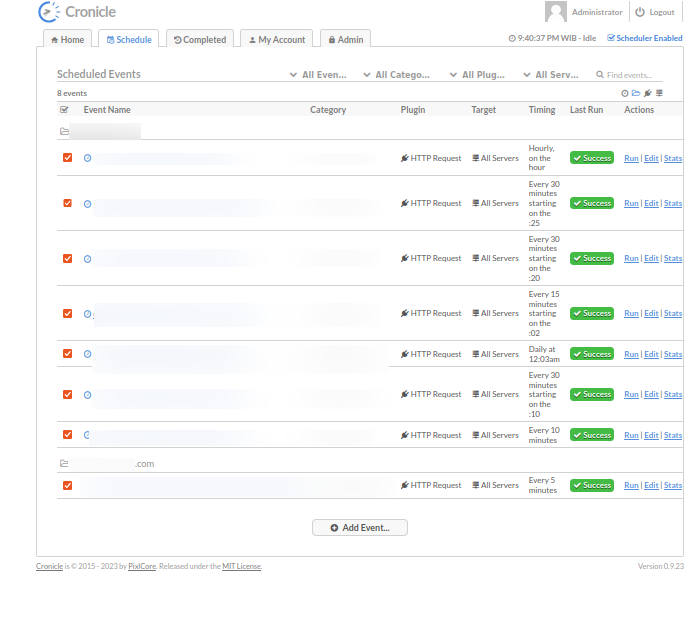
This Where You Create Cron
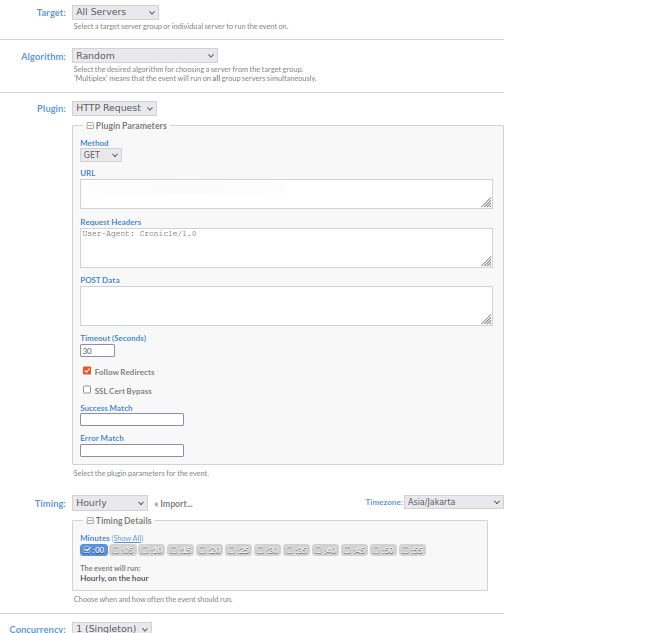
Crontab Style
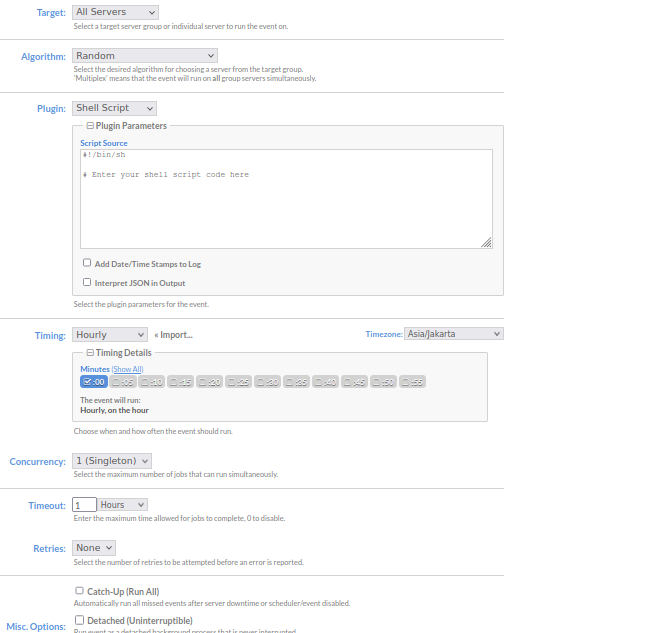
Or You Can Make Schedule To Run Script
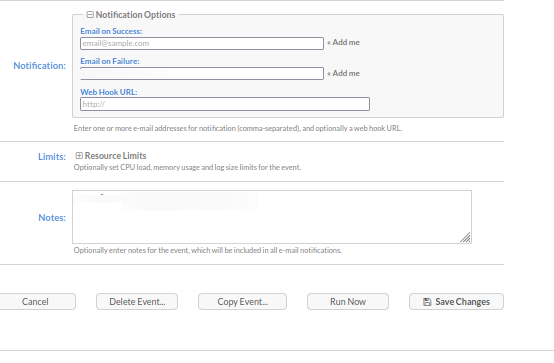
You Can Send Notif If Cron Success or Failed
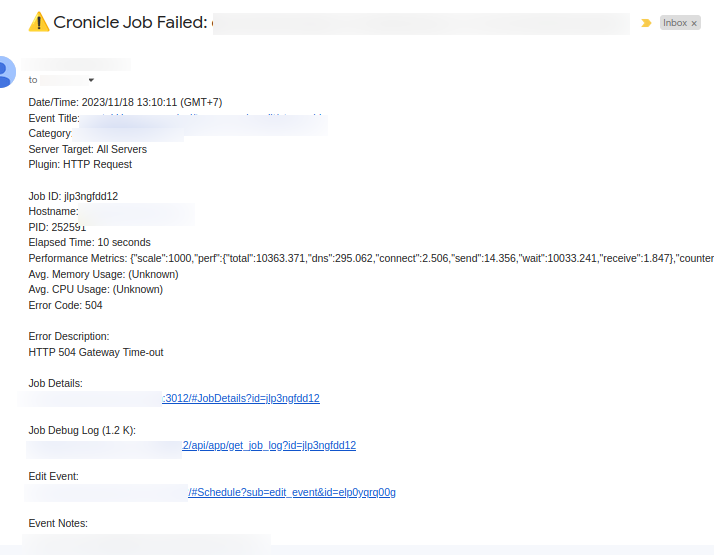
Notif When Schedule Failed
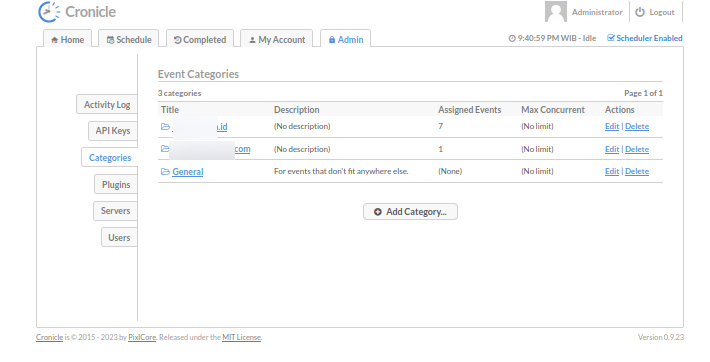
Create Event To Organize Your Schedule
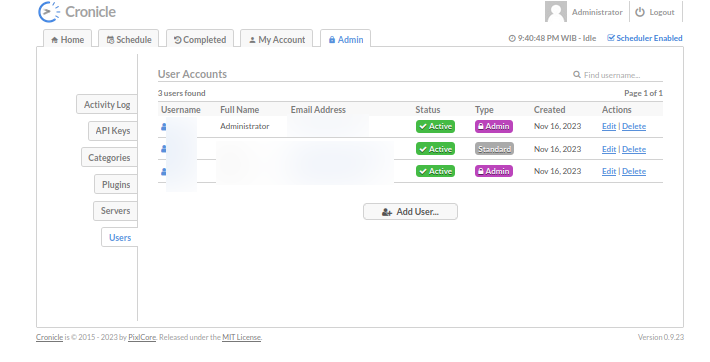
You Can Add New User With Different Role
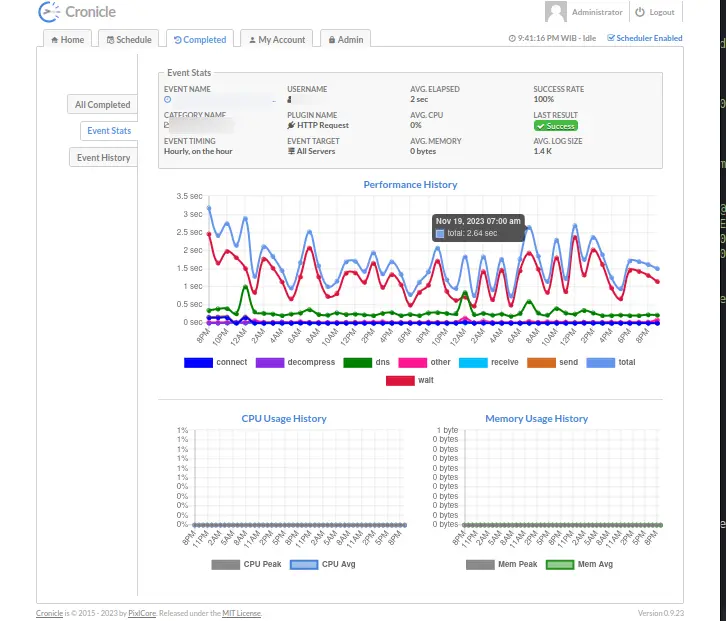
You Can Check Cron Stat
Reference:
